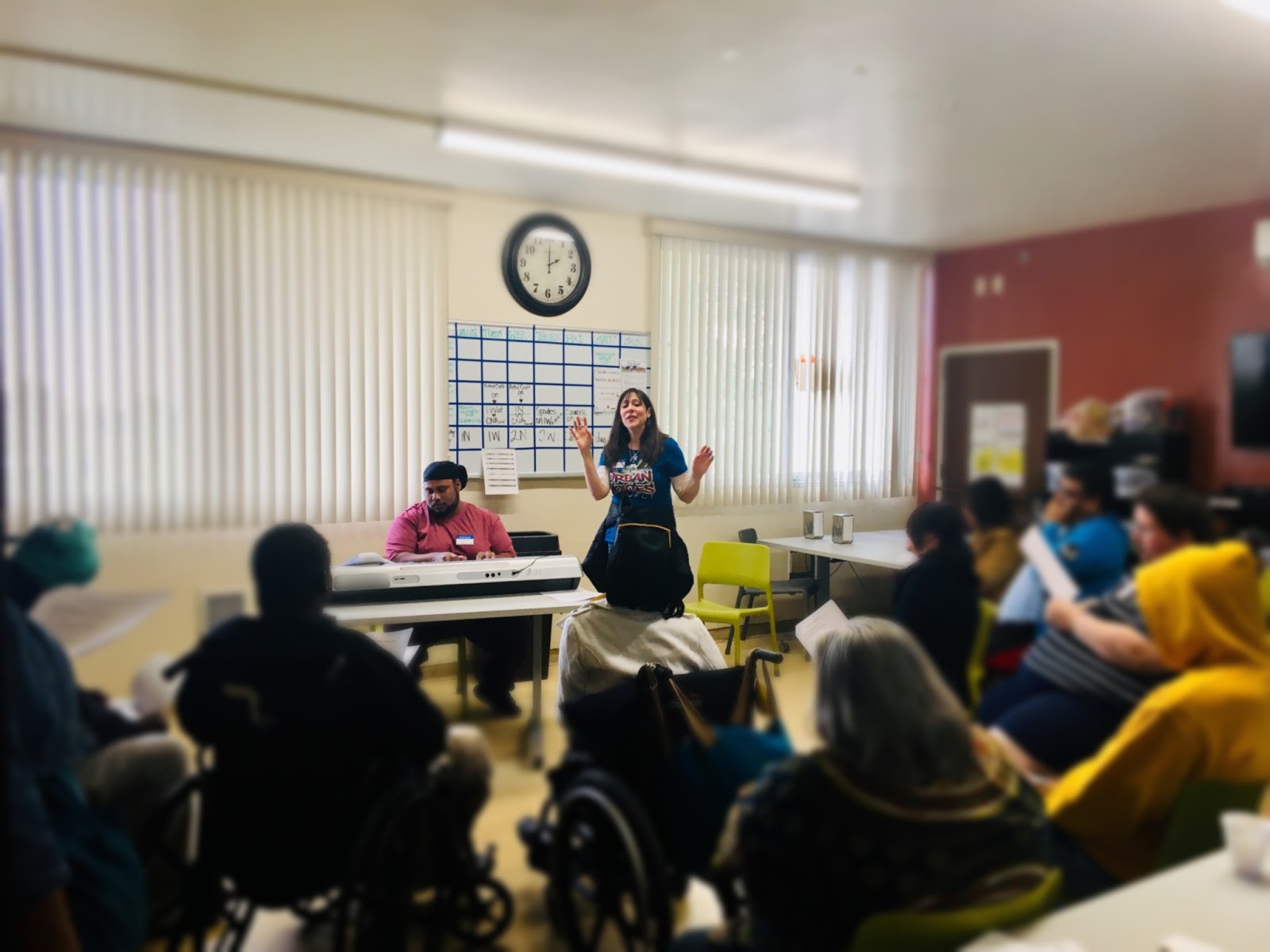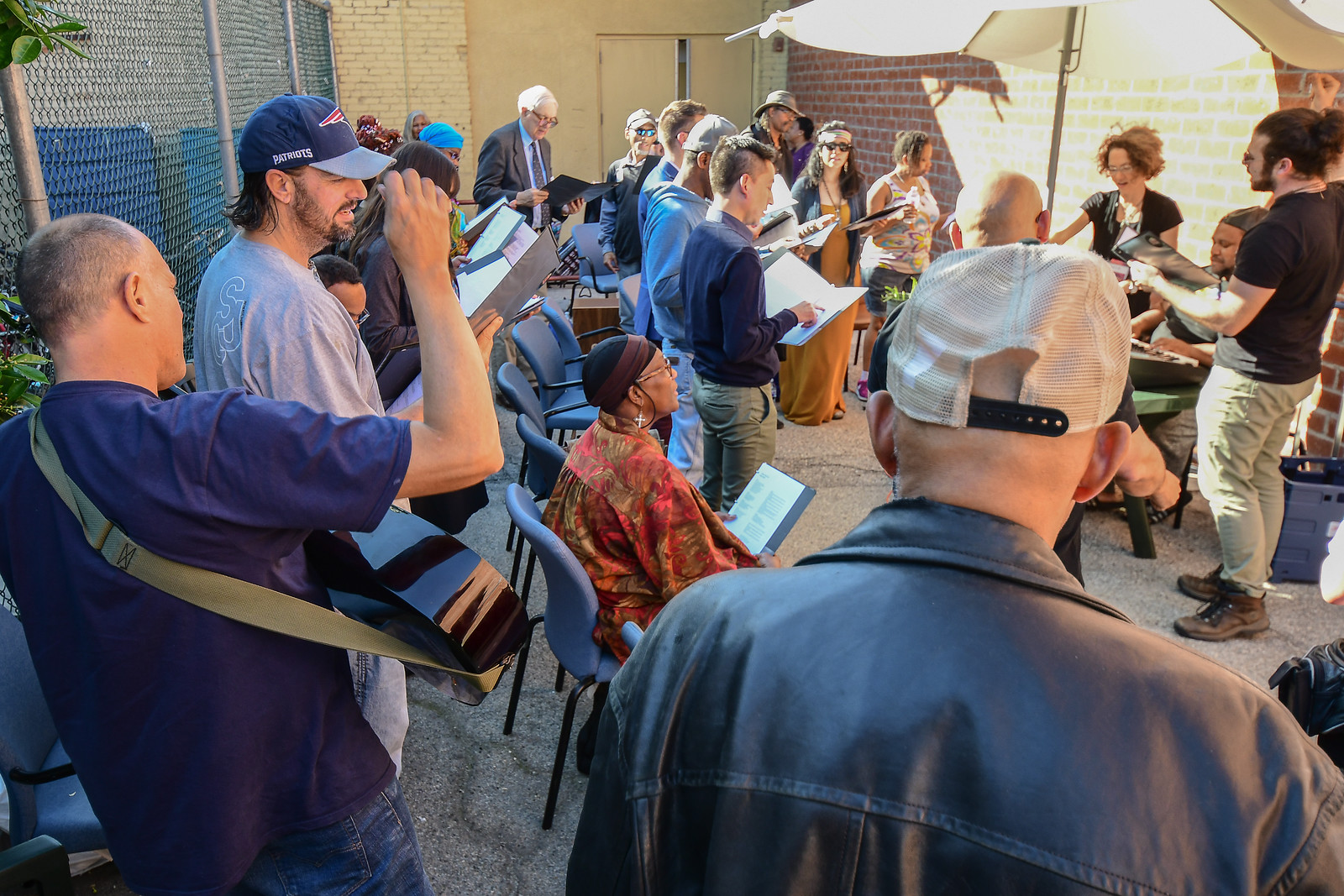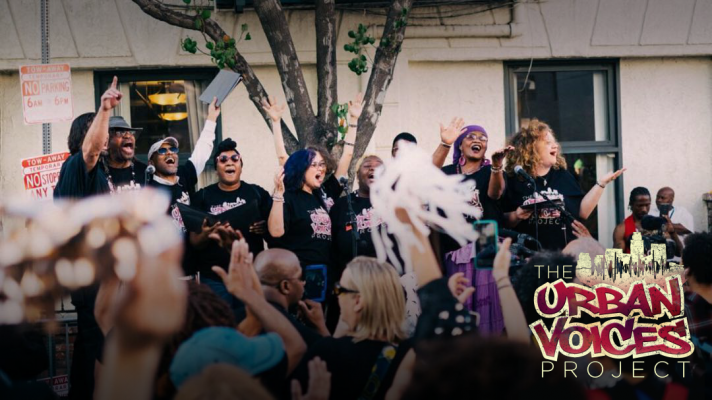All together now — singing is good for your health.
Urban Voices Project is bringing that healing power to individuals marginalized by homelessness, mental health issues, and unemployment in Los Angeles. The non-profit’s community singing groups and music education classes are helping people manage their stress, anxiety, depression, and trauma. And these community engagement programs are also serving as a bridge to local medical care and social services.
Building a Street Choir
Urban Voices Project got its start as a short-term community outreach effort in downtown Los Angeles. The Colburn School, a renowned conservatory of music, partnered its neighbor the John Wesley Community Health Institute (also known as Wesley Health Centers), which provides care to underserved communities, to start a “street choir.” Their goal was to recruit residents of Skid Row to sing together once a week, learn some songs, and eventually perform at Wesley’s annual gala in October 2013.
The gala was a big success — and Urban Voices knew it couldn’t stop these singing workshops. The founders, Leeav Sofer and Christopher Mack, told the singers, “If you show up, we’ll show up.”
Today, Urban Voices has grown into 200+ classes each year. Its free programs, a majority of which operate out of the Wesley Health Center on South San Pedro, include:
- Urban Voices Project Choir, the ensemble singing activity that started it all. This non-audition choir is made up of current and former Skid Row residents. They rehearse once a week and perform at events around Los Angeles County and beyond.
- Music Wellness Labs, which offer music meditation, mindfulness, self-expression and exploration through music in a group setting.
- Music Education Labs, where diverse professionals from the Colburn School, LA Philharmonic, LA Master Chorale, and LA Opera teach music theory, vocal technique, songwriting, and more.
- Community Sing, a weekly choir meet-up. Community members are invited to drop-in and sing with local professionals and volunteers. In addition to the Wesley Health Center location, Urban Voices is now piloting satellite gatherings at Los Angeles Central Library, MLK Recuperative Care Center, and a program that serves youth living in the condition of homelessness.
- Family Sing, a new mommy-and-me class that combines parenting skills with early childhood music programming. Urban Voices is currently piloting this program at both a Skid Row mission and a LA Care Family Resource Center.
The focus is on inspirational, popular music. Favorites include Bill Withers’ “Lean on Me,” India Arie’s “Give Thanks,” Nina Simone’s “Feeling Good,” Aretha Franklin’s “Bridge Over Troubled Water,” and Johnny Nash’s “I Can See Clearly Now,” plus originals like “Walk with Me” by Maggie Wheeler and “Unbreakable” by Coco Love Alcorn.
“These songs have room for people to share their story or something that happened in their day. We’re using the structure of the song to invite personal expression and social interaction,” said Kate Richards Geller, Urban Voices’ associate director and music therapy consultant. “They’re engaging in it so they can build hope, strength, and resilience.”
The Healing Power of Music
Research has shown that singing actually can have a number of physical and psychological benefits. It can boost the immune system. Singing is beneficial for improving breathing capacity, muscle tension, and posture. It releases feel-good neurochemicals such as dopamine, serotonin, and endorphin, which is probably why it’s used for pain relief. Singing can help people suffering from dementia, mental illness, and depression.
“Music on a fundamental level creates such opportunity for change in the brain and in the body,” said Kate Richards Geller.
At the same time, Richards Geller said she’s personally witnessed how group singing can combat isolation and loneliness — some of the most difficult experiences of being homeless. When some Urban Voices participants initially come to sing, they come in with their defenses up; they’re in survival mode and coping the best they can. But participating in group singing quickly forges bonds and positive social interactions. By bringing camaraderie and collaboration into their lives, Urban Voices has created a sanctuary in the heart of the Skid Row community.

A Bridge to Health and Wellness
What separates Urban Voices from other street choirs popping up around the country is the fact that it operates out of a health clinic. The non-profit is using music to motivate healthy behavior.
“Getting people into a clinic, we learned, is difficult. Connecting people with social services and mental health is hard,” said Richards Geller. “But if we get them in the door to sing, it feels good and then they stay. Then we have doctors and nurses join our activities, so people get a chance to meet them.”
Those introductions and direct access are helping participants get the help they need. Anecdotally, participants have started scheduling medical appointments around choir practice and music classes. Patients are also better at adhering to their medication regimes. Singing in the clinic is breaking down the stigma around mental health and showing patients how to navigate the complex health care system. And once participants openly share their feelings and experiences through song, they’re much more likely to seek out professional care.
“When they start consistently showing up, they’re motivated to have more stability in their lives,” said Richards Geller. “They start looking for jobs and secure housing. They start accepting help and trusting other members of the choir, who help each other connect to social services that they’ve found successful.”
Richards Geller has also witnessed how group singing sparks self-care and a sense of purpose. “We start to see people care more about themselves and the people around them. This manifests itself as a rise in self-worth and changes the ways they comfort and interact with each other as members of an ensemble.”
Urban Voices Project is now working with Wesley Health Centers to measure these transformational stories. The aim is to collect data to quantify these stories of health — specifically, a lower rate of missed appointments, compliance with prescriptions, and reduction in unnecessary emergency department visits.
Community Connections

The Urban Voices Project Choir is also an educational tool to further inform communities about the human condition of homelessness. At performances, members are telling their stories, changing the narrative around displacement and confronting the public’s misconceptions about poverty and the many other things that lead to homelessness. They’re demonstrating how they’ve been able to transcend their circumstances. They’re showing folks that art and creativity exists in one of America’s largest homeless enclaves.
Currently, the choir has about 30 members committed to performing as a professional ensemble. This spring, the choir sang at start of the the Los Angeles Marathon, offered an evening of stories and song at a popular venue in Los Angeles, and put on a recital that featured both solo and ensemble pieces as the culmination of one term of the Music Education Lab.
Soon the choir will be performing at our upcoming Safety Net Innovation Network meeting.
Next Steps
Urban Voices is working on dissecting exactly what they’re doing right in their programs, so they can develop a teacher training program and show others how to start their own group singing workshops.
Already they’ve identified one key ingredient of that secret sauce: community engagement.
“It has to be organized from the bottom up. It has to be loved by the members themselves, otherwise we’re at risk of not understanding of what they need and what’s of value,” Richards Geller said. “We work hard to stay connected, communicating openly and transparently, so we can make sure they know it’s their choir.”

